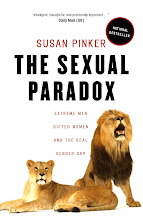It was during a sabbatical in France in the early nineties that one of my sons first confronted gender stereotypes—his own. He had scarlet fever, and as he waited naked on a clinic gurney for the doctor to appear, his eyes widened in terror as an older male physician suddenly swished into the cavernous examining room. “Mom! Can a man be a real doctor ?” he whispered.

At home he had a female pediatrician, a female family doctor, and a female dentist. I couldn’t blame the 3-year-old for thinking that clinical medicine was women’s work (at that point his ambition was to be a pirate).
We reminded him of his initial skepticism about male doctors when he entered McGill University as a biology major last September, and found himself surrounded by nose-to-the-grindstone female biology and pre-med students taking their prerequisites. He says he’s pleased to be surrounded by women, which is a good thing, as 60% of university students (and medical students) are female, not only at McGill University, but everywhere in the industrialized world. According to Mark Perry, an economist at the University of Michigan, there are now 148 women earning university degrees for every 100 men. At the Masters level, the ratio is 159 women to 100 men.

The only place this isn’t true is at military colleges like US Air Force Academies, where women constitute just 17% of the student body. But this gender gap is not the only way these educational institutions differ from other colleges. Military students pay no tuition fees and receive an $850 monthly stipend for expenses, in contrast to the tens of thousands a university education costs elsewhere in the United States. Air Force academy students also take a predetermined set of courses and are obliged to serve five years in the military after they graduate—conditions that might deter students who have other ambitions and other choices.
Finally, these schools may attract students-- and staff-- who crave belonging to highly structured community--where the clues to how and where they fit in are made perfectly explicit. In psychologist Jonathan Haidt's interesting essay, Hanging Out with the Boys, he refers to the social aspect of human beings as "bees without hives." And individual differences being what they are, I suspect that some of us crave a hive more than others.
Yet despite these clear differences in their student populations--in gender, socioeconomic status, and the need for structure--a recent paper by researchers based at the University of California, Davis extrapolates from their small pool of atypical female students (fewer than 800 students in a total student body of 4,500) to make sweeping conclusions. According to their study, gifted female students would fare better in science (i.e. they would be much more likely to graduate with a physical science, technology, engineering or math--STEM-- degree) if they had female, rather than male teachers. And though female teachers don't affect whether students then drop out, or feel happy or keenly interested in their discipline, the authors conclude that this such a desirable outcome, that women studying science should have only other women as their teachers.
The authors, Scott Carrell, Marianne Page and James West, write about their own student population that:
“..among the highest ability women, those whose introductory math and science professors are exclusively female are 26% more likely to major in STEM careers than those who had exclusively male faculty..."
They then conclude that “increasing the fraction of female professors from 0 to 100 percent would completely eliminate the gender gap in math and science majors."
This study can’t actually make that prediction, or say that female teachers are causing that 26 point increase. What’s more likely is that the female students and teachers in this study are a highly select bunch. There may be a profile of the kind of woman who wants to go into the army (and stay there), perhaps one who feels that this is her best, or only stab at a university education. Or, it may be a certain type of woman who feels quite comfortable "hanging out with the boys " (as the college is 83% male, there would be quite a lot of that). Still, when she sees a woman teaching biology or chemistry at her military college she thinks, yeah, I’d much rather do that than go to Iraq.
So it's hard to tell what's driving this mild boost in science, especially given that this study also shows that having female teachers is also correlated with poorer performance in the humanities-- for students of both sexes. I do know that the gifted women who have chosen, completed a major, then left STEM disciplines don’t attribute their lack of enthusiasm to having male professors, but to having broader interests. They say things like “I just got tired of debugging software,” or “I’d rather be reading literature and history than mixing petrochemicals.” And this is what recent data tell us, that women talented in math and science often choose people-oriented work, like clinical medicine, the humanities, or cognitive psychology. Many avoid technical careers because they have discursive interests or crave a social purpose in their work. That’s not to say that having female science professors isn’t a good thing. It’s just that, as my young son discovered that day in Montpellier, it’s not whether a professional is male or female that really counts. It’s how good he or she is at identifying an anachronistic infection, and whether that person cares enough to comfort the little boy who has it.

